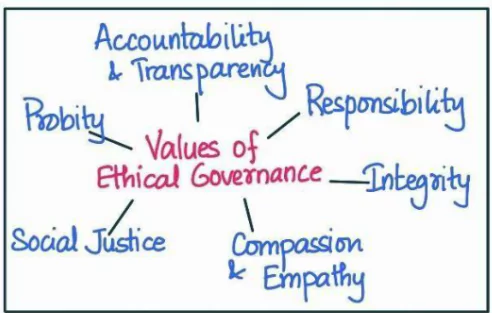Answer:
|
How to approach the question
- Introduction
- Write about ethical governance.
- Body
- Write the challenges in ensuring ethical governance in India.
- Write the potential role of the Karmayogi Mission in addressing these challenges.
- Write the issues faced by Karmayogi Mission in this regard.
- Conclusion
- Give appropriate conclusion in this regard,
|
Introduction
Ethical governance encompasses a model of governance that prioritizes ethical principles like truth, transparency, accountability, and integrity in decision-making.
Body
Challenges in ensuring ethical governance in India
- Corruption: Corruption remains a significant challenge in ethical governance. For instance, the infamous 2G spectrum scam in 2010 involved high-ranking officials and politicians who abused their positions for personal gain.
- Lack of transparency: The lack of transparency hampers ethical governance. The case of the Adarsh Housing Society scam revealed how officials colluded to provide prime real estate to influential individuals without proper procedures.
 Political interference: Politicians often interfere in administrative matters, compromising ethical governance. The transfer of honest officers due to political pressure undermines the autonomy and integrity of the civil service.
Political interference: Politicians often interfere in administrative matters, compromising ethical governance. The transfer of honest officers due to political pressure undermines the autonomy and integrity of the civil service.- Lack of accountability: Insufficient accountability mechanisms impede ethical governance. The Vyapam scam, which involved manipulation of entrance exams in Madhya Pradesh, exposed the lack of accountability within the system.
- Inadequate Whistleblower protection: The murder of IAS officer D.K. Ravi, who exposed tax evasion by influential individuals, underscores the need for robust protection.
Potential role of the Karmayogi Mission in addressing these challenges
Mission Karmayogi is the National Programme for Civil Services Capacity Building (NPCSCB) launched in 2020 aims to foster ethical behaviour through proper training.
- Comprehensive Ethical Training: It will enable them to understand and navigate complex ethical dilemmas. For example, civil servants may be educated about the principles of integrity, transparency, and accountability through case studies.
- Role-based service: The mission aims to make civil service ‘role-based’ which would provide better role clarity and objectivity in decision-making.
- Ethical Decision-Making Frameworks: It will enable them to make informed choices when faced with ethical dilemmas. These frameworks may include principles such as the utilitarian approach or the deontological perspective.
- Strengthened Accountability Mechanisms: By implementing robust systems to monitor and evaluate the performance of civil servants. This includes regular assessments, feedback mechanisms, and audits to ensure ethical conduct.
- Integrity Pacts: The mission promotes integrity pacts in government contracts, which require both parties to commit to ethical practices and discourage bribery or corruption to maintain transparency and fairness in the procurement process.
- Public Awareness and Engagement: The mission conducts public awareness campaigns to educate citizens about ethical governance and encourage their active participation in promoting ethical practices.
- Continuous Learning and Development: iGOT Karmayogi aims to provide online, face-to- face and blended learning enabling lifelong learning for the officials. This ensures that civil servants stay updated on ethical practices and challenges.
Issues faced by Karmayogi Mission in this regard
- Political interference: The mission’s effectiveness is hindered by political interference, as politicians often manipulate the system to protect their interests and escape accountability which undermines the goal of fostering ethical leadership.
- Inadequate transparency: Critics argue that the mission itself lacks transparency in its operations, such as the selection process of leaders and the allocation of resources.
- Lack of citizen participation: The mission’s impact can be limited if citizens are not actively engaged in holding leaders accountable. While the mission emphasizes citizen empowerment, low levels of public awareness and participation hinder its progress.
- Inadequate legal framework: Critics argue that the existing legal framework lacks the teeth needed to effectively tackle ethical violations. Weak legislation and loopholes allow unscrupulous leaders to evade accountability, undermining the mission’s efforts.
- Limited Resources: Insufficient financial and human resources can hinder the mission’s efforts to effectively address the challenges of promoting ethical leadership.
Conclusion
Addressing these issues and criticisms requires a multi-pronged approach, including stronger legal frameworks, enhanced public awareness, robust training programs, and a commitment from political leaders to prioritize ethical leadership over personal gain.
To get PDF version, Please click on "Print PDF" button.
 Political interference: Politicians often interfere in administrative matters, compromising ethical governance. The transfer of honest officers due to political pressure undermines the autonomy and integrity of the civil service.
Political interference: Politicians often interfere in administrative matters, compromising ethical governance. The transfer of honest officers due to political pressure undermines the autonomy and integrity of the civil service.
https://uploads.disquscdn.com/images/1e11b9016f6e2d31c3f1aee6ec26dd82e8290398a5ad66c9db750bef8702f813.jpg https://uploads.disquscdn.com/images/83ac9317e639fd7f773655b802ba62dc09ae3fc81bbdaae584b7415315ddcb74.jpg
https://uploads.disquscdn.com/images/0e6dd127aa8ac6f14661e6f4e983c83370b7f30e6be71ea8e85d6e193c078dc9.jpg https://uploads.disquscdn.com/images/a3e51f15bc7a171f474209ab5428de9ff4a9e8e38d341304858ee63a344320b2.jpg
https://uploads.disquscdn.com/images/4fc6aba28b58c03674698e22dd8d7c4e4536853ff844c88cf1471d100a9e4fc7.jpg https://uploads.disquscdn.com/images/c5991bdd73706a45cbd6ca22cfcbffe88f1eb3a370a5e47af1f83a2ebf9d3975.jpg https://uploads.disquscdn.com/images/f4e3655502050406e69fc44b999248614bfae6ec17360bea9e9628abd8c2ab02.jpg
https://uploads.disquscdn.com/images/b98f2472475b3340c6651233abd54bfd862e5b1f7cab98de4ee43ebf56279b5b.jpg https://uploads.disquscdn.com/images/b909df184789ba13532276efcd7c6b89637d8da5904ee7f7055c9205132ba906.jpg